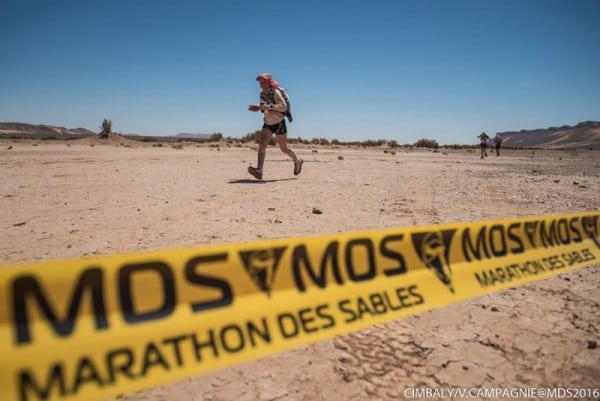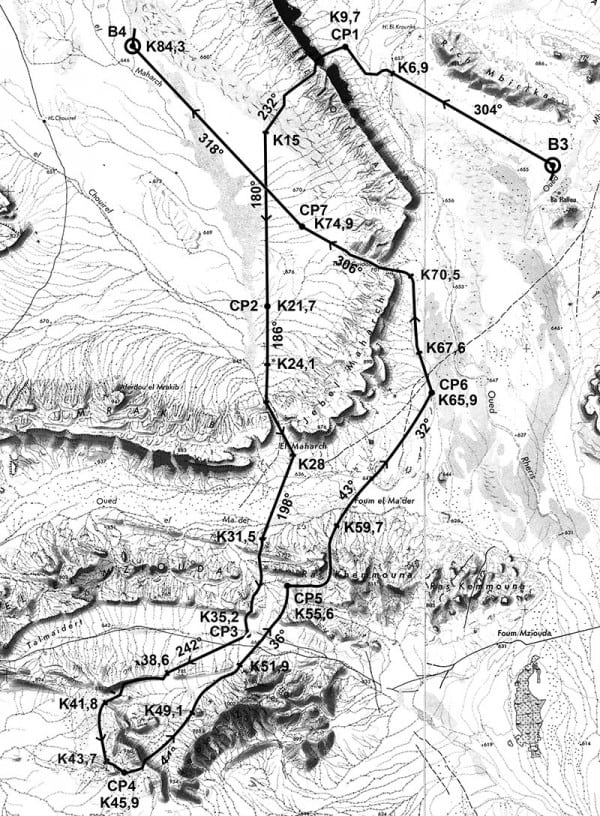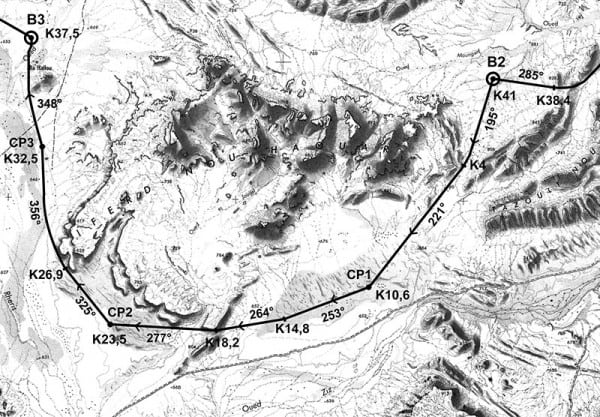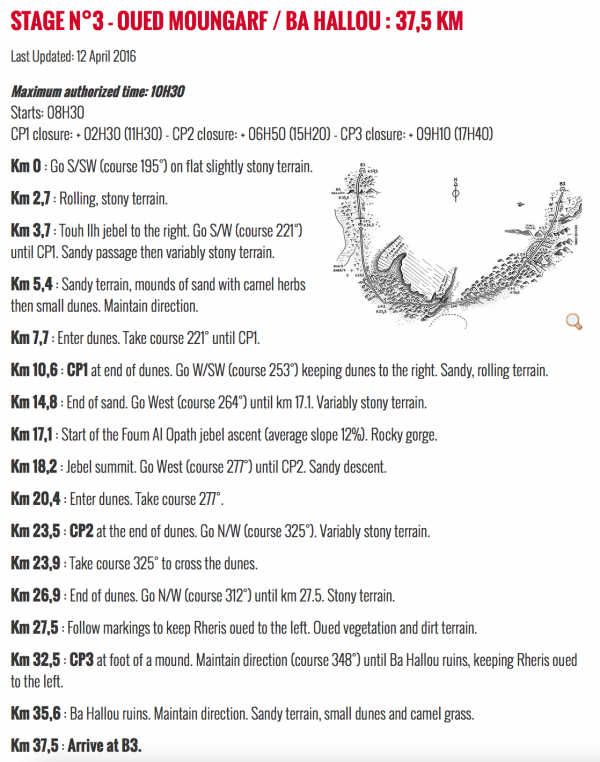 The 31st Marathon des Sables (MdS) began the morning of Sunday, April 10 in the Moroccan Sahara with more than 1,100 participants toeing the line. For those unfamiliar, the MdS is a seven-day, six-stage race (only the first five stages count toward the rankings this year) in which competitors carry all their own supplies except for a daily water ration and a shade tent to sleep under… which they share with seven other competitors.
The 31st Marathon des Sables (MdS) began the morning of Sunday, April 10 in the Moroccan Sahara with more than 1,100 participants toeing the line. For those unfamiliar, the MdS is a seven-day, six-stage race (only the first five stages count toward the rankings this year) in which competitors carry all their own supplies except for a daily water ration and a shade tent to sleep under… which they share with seven other competitors.
At the conclusion of Stage 5, Morocco’s Rachid El Morabity became the winner for the fourth time and Russia’s Natalia Sedykh won her first MdS.
As in past years, we have shared results and commentary–including updates from the field–after each stage. We updated stage results multiple times per day, as additional information, updates, and resources are available. Click on the links below to jump to our coverage of a particular stage:
Here are some additional resources to help you follow on all the action from the race:
- Our 2016 Marathon des Sables preview;
- The Marathon des Sables website, competitor list, and the two live-tracking means (links to the first and second) we’ve located (we’ll update this link list as the week goes on); and
- The link for writing competitors.
If you enjoy iRunFar’s coverage of the Marathon des Sables, consider subscribing to the website via RSS or via email.
You can also look to Facebook and Twitter to find supplementary iRunFar information not found on iRunFar.com. With that in mind you may want to consider liking of iRunFar on Facebook as well as following iRunFar on Twitter.
Stage 5: Hassi Tarfa to Bou Makhlouf (42.2 km)
Stage 5 Field Report from Jacqueline Kantor
There was one podium spot close enough to shake up on the fifth stage of the 2016 edition: the battle for men’s third place between Spain’s Chema Martinez and Morocco’s Aziz El Akad. In today’s fifth stage, El Akad hung with race frontrunner Rachid El Morabity and Abdelkader El Mouaziz to finish about 28 minutes ahead of Martinez and jump into the third spot. If provisional results stand, this year’s podium should be an identical repeat of last year’s: El Morabity (21:01.21), El Mouaziz (21:05.38), and El Akad (22:07.30).
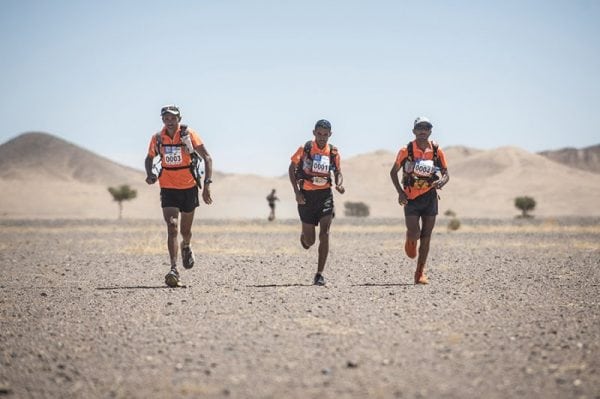
The stage’s and overall race’s podium (left to right with overall placings): 3rd. Aziz El Akad, 1st. Rachid El Morabity, 2nd. Abdelkader El Mouaziz. Photo: Cimbaly MdS 2016
Martinez had led El Akad by seven minutes and 30 seconds after the long stage. El Akad hung with his teammates throughout the marathon stage to extend the gap—“after the long stage, I had no choice,” he said. “I had to put all of my energy into this stage.”
El Morabity’s fourth MdS win puts him one victory away from the legendary Mohamad Ahansal’s record. He jumped over the finish line with his fist in the air, and moments after, he was already talking about exceeding Ahansal’s five wins in the next few years. The plan was to start with a strong rhythm, he said, and help keep El Akad at a pace that Martinez could not follow. The Moroccan top finishers, joined by teammate Samir Akhdar, rushed into a crowd of local staff and drivers waiting beyond the finish, and began chanting a Berber song and drumming on half-empty water bottles. Just beyond the finish, competitors from the first wave of runners screamed as they crossed the finish and posed in front of the live webcam with arms raised, hitting their hearts with their hands and blowing kisses at the camera.
Less than an hour after the finish, Martinez expressed concerns that a checkpoint stop had delayed his race. He finished sixth overall with a time of 3:39.20, and five minutes were deducted from his finish time to make up for the time lost on the course, which will not change his overall standing.
“It was a very fun race, a dangerous race, but I am alive,” she said. “I am happy.”
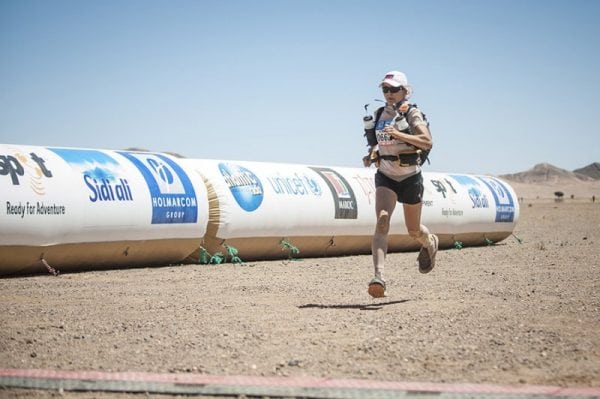
Natalia Sedykh winning Stage 5 and the 2016 Marathon des Sables. Photo: Cimbaly MdS 2016
Nathalie Mauclair finished some 22 minutes later in second third place. Wyan Chow started in the early wave today, ran incredibly well, and ran the second-fastest time for the women in Stage 5.

Nathalie Mauclair taking second in the 2016 Marathon des Sables. Photo: Cimbaly MdS 2016
American Jason Schlarb finished the final stage of his MdS debut fifth and will move up in the standings. [Editor’s Note: It looks like Jason finished as 11th man in the overall rankings.] He had not worn a substantial pack while running before this race, and did not do any heat acclimatization leading up to the race.
“This has been a miserable challenge, a misery train, but a life experience,” he said. “Today was the easiest day for me. I’ve accomplished it, and I’m happy.”
[Editor’s Note: Meghan Arbogast finished 13th on the day to hold her spot as 10th women overall and finish top American women.]
Stage 5 Competition Analysis
[Editor’s Note: The competition analyses in this article have been written by iRunFar Senior Editor Meghan Hicks, who is not racing MdS this year but who has finished the MdS five times.]
Another year of the MdS comes and goes with the completion of Stage 5! At this point, we’ve analyzed this race through and through, so there isn’t too much left to say, except that it’s our turn to go quiet and let the runners emerge from the desert–after one more night sleeping with in their tents and living in self-sufficiency and a non-competitive, charity Stage 6, which takes place on Saturday–and tell each of their stories.
Without a doubt and with his fourth MdS win, Rachid El Morabity cements himself into history alongside the two Moroccan legends of the race, brothers Lahcen and Mohamad Ahansal, who historically have dominated the winner’s spot of this race. It is perhaps fitting, as Rachid comes from the same town as Lahcen and Mohamad, a small town at the edge of the Sahara called Zagora, and trained under Mohamad for quite some time. They grow them wicked fast out there in the desert, don’t they? An amazing part of Rachid’s story that we can’t forget is his 2012 race, where he broke his femur during Stage 4 while leading the race, was medivac-ed out of the race’s remote location, and underwent major surgery. To return from that sort of major injury and enter back into competitive dominance as he has makes Rachid’s a double Cinderella story.
Another competitive note on the women’s race, Natalia Sedykh and Nathalie Mauclair put on quite a show over the course of the race and showed what’s possible for women at the MdS. That said, they were just two members of a highly competitive women’s field, more competitive than any other MdS edition, I’d have to venture a guess. In true MdS style, the unique and difficult racing and living conditions roughed up some of the race favorites, taking them out of contention by the end of the week. But also in true MdS style, a few new faces emerged from the fray, women who managed to sort through those challenges and come out of them a bit faster than their competition. A new day dawns on women’s MdS competition with the 2016 edition.
In addtion to what Natalia and Nathalie did at the front of the race in terms of pushing boundaries, Moroccan Aziza Raji was her own sort of boundary pusher thisweek. Though this is changing, Moroccan social norms for women don’t generally include sports except in minority situations, and the MdS has seen only a handful of Moroccan women participate in the race’s 31-year history. With Aziza’s fifth place, she’ll certainly return to the rest of her life a role model for her female countrymates.
Men’s Stage 5 Results
- Abdelkader El Mouaziz (Morocco) — 3:11:32
- Aziz El Akad (Morocco) — 3:11:34
- Rachid El Morabity (Morocco) — 3:11:41
- Samir Akhdar (Morocco) — 3:18:54
- Erik Clavery (France) — 3:27:24
- Jason Schlarb (US) — 3:37:21
- Jose Manuel ‘Chema’ Martinez (Spain) — 3:39:24
- Carlos Sa (Portugal) — 3:39:46
- Michal Glowacki (Poland) — 3:41:05
- Sondre Amdahl (Norway) — 3:41:14
Full stage and overall results.
Women’s Stage 5 Results
- Natalia Sedykh (Russia) — 3:45:12
- Nathalie Mauclair (France) — 4:07:08
- Aziza Raji (Morocco) — 4:32:07
- Elisabet Barnes (Sweden) — 4:46:03
- Sophie Laversanne (France) — 4:48:46
- Rosemary Lobley (UK) — 4:50:42
- Corinne De Parseval (France) — 4:52:48
- Elise Delannoy (France) — 5:19:01
- Annick Ballot (France) — 5:22:04
- Emelie Dardet (France) — 5:22:33
Note: Pui Yan “Wyan” Chow of China was originally listed as placing second in 3:50:23 based on provisional results. Her time was later updated to 6:50:23. Similarly, Fernanda Maciel of Spain was originally awarded a time of 4:43:00 and fifth place on the stage. Fernanda was given a two-hour penalty and an updated stage time of 6:43:00.
Full stage and overall results.
Men’s Overall Standings through Stage 5 (the Race’s Finish)
- Rachid El Morabity (Morocco) — 21:01:21
- Abdelkader El Mouaziz (Morocco) — 21:05:38
- Aziz El Akad (Morocco) — 22:07:30
- Chema Martinez (Spain) — 22:27:50
- Erik Clavery (France) — 23:00:18
- Samir Akhdar (Morocco) — 23:46:31
- Jean-Sebastien Braun (France) — 23:57:03
- Carlos Sa (Portugal) — 23:59:57
- Sondre Amdahl (Norway) — 24:08:58
- Marco Pajusco (Italy) — 24:41:35
- Jason Schlarb (US) — 24:58:36
Full stage and overall results.
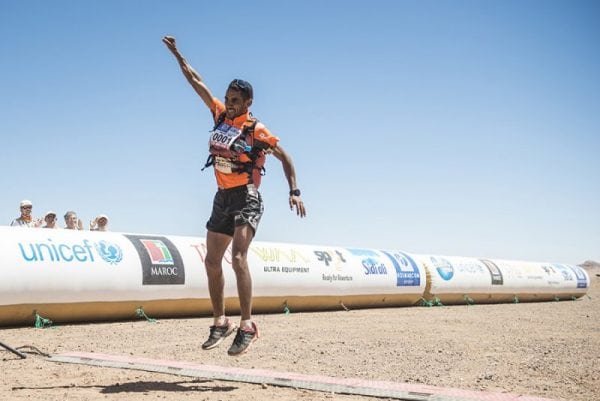
Rachid El Morabity winning Stage 5 and the overall 2016 Marathon des Sables.
Photo: Cimbaly MdS 2016
Women’s Overall Standings through Stage 5 (the Race’s Finish)
- Natalia Sedykh (Russia) — 24:45:26 (11th overall)
- Nathalie Mauclair (France) — 25:30:55 (13th overall)
- Fernanda Maciel (Spain) — 29:58:43 (was provisionally 27:58:43)
- Elisabet Barnes (Sweden) — 30:02:26
- Aziza Raji (Morocco) — 30:41:31
- Sophie Laversanne (France) — 31:37:01
- Corinne De Parseval (France) — 32:16:47
- Selina McCole (UK) — 34:25:26
- Meghan Arbogast (US) — 35:07:01
- Rosemary Lobley (UK) — 35:23:55
Note: Pui Yan “Wyan” Chow of China has a provisional time of 33:18:42, which placed her 8th in the final rankings. She later had 3 hours added to her Stage 5 time, which dropped her to 12th.
Full stage and overall results.
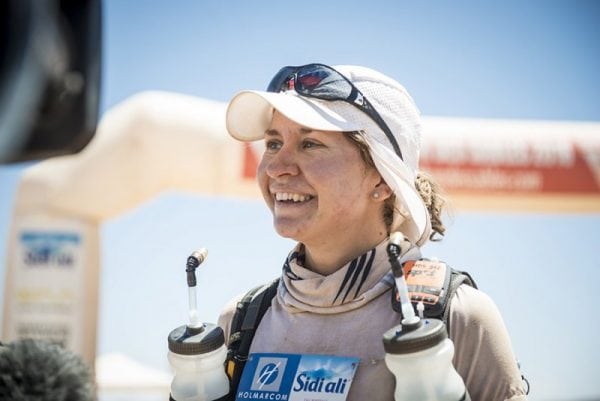
2016 MdS women’s champ Nathalie Sedykh. Photo: Cimbaly MdS 2016
Additional Information
- Stage 5 Roadbook (course map and description)
- Official Stage 5 Photos
Stage 5 Route Information
At a true marathon’s distance, 42.2 kilometers, Stage 5 was a runner’s route. While the course interspersed with sand dunes here and there, a jebel, and a couple other pace-sucking elements, this year’s Stage 5 marathon course appears to have followed suit with MdS tradition: a perfect marathon and ‘easy,’ runnable terrain–at least in the context of the Sahara Desert and what runners have seen over the course of the week.

Stage 5 map. Image courtesy of the Marathon des Sables.
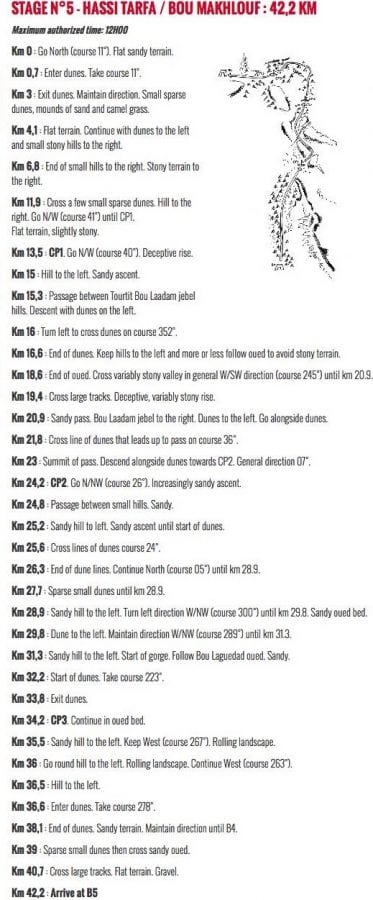
Stage 5 route description from the race’s official Roadbook. Image courtesy of the Marathon des Sables.
Stage 4
Stage 4 Results
Men
- Rachid El Morabity (Morocco) — 8:11.24
- Abdelkader El Mouaziz (Morocco) — 8:14.28
- Chema Martinez (Spain) — 8:25.55
-
Aziz El Akad (Morocco) — 8:28.04
-
Erik Clavery (France) — 8:41.20
-
Jean-Sebastien Braun (France) — 8:52.31
-
Marco Pajusco (Italy) — 8:59.15
-
Carlos Sa (Portugal) — 9:04.36
-
Sondre Amdahl (Norway) — 9:11.49
- Jason Schlarb (US) — 9:39.47
Full stage and overall results.
Women
- Nathalie Mauclair (France) — 9:07.59
- Natalia Sedykh (Russia) — 9:19.53
- Fernanda Maciel (Spain) — 10:30.12
-
Elisabet Barnes (Sweden) — 11:36.11
-
Sophie Laversanne (France) — 12:00.25
-
Corinne de Parseval (France) — 12:08.32
-
Aziza Raji (Morocco) — 12:12.37
-
Selina McCole (UK) — 12:25.35
-
Pui-Yan ‘Wyan’ Chow (China) — 12:52.14
-
Meghan Arbogast (US) — 13:14.52
Full stage and overall results.
Overall Standings through Stage 4
Men
- Rachid El Morabity — 17:49.40
- Abdelkader El Mouaziz (+4.26)
- Chema Martinez (+58.46)
- Aziz El Akad (+1:06.16)
- Erik Clavery (+1:43.14)
- Jean-Sebastien Braun (+2:19.01)
- Carlos Sa (+2:30.31)
- Sondre Amdahl (+2:38.04)
- Margo Pajusco (+2:53.45)
- Jason Schlarb (+3:31.35)
Full stage and overall results.
Women
- Natalia Sedykh (21:00.14)
- Nathalie Mauclair (+23.33)
- Fernanda Maciel (+2:15.29)
- Elisabet Barnes (+4:16.09)
- Aziza Raji (+5:09.10)
- Sophie Laversanne (+5:47.59)
- Corinne de Parseval (+6:23.45)
- Selina McCole (+7:10.46)
- Pui-Yan ‘Wyan’ Chow (+8:28.05)
- Meghan Arbogast (+8:37.07)
Full stage and overall results.
Stage 4 Field Report from iRunFar Correspondent
[Editor’s Note: The field reports in this article have been written by iRunFar field correspondent Jacqueline Kantor.]
Update April 14 10 am US Mountain Time:
Runners continued to trail in throughout the early morning of the fifth day in the desert, Thursday, as top finishers, who had made their way back after sunset last night, enjoyed a day off before the marathon stage. There’s a 35-hour time limit on the 84.3-kilometer long stage, which ends on Thursday evening.
The men’s race is poised to turn out with the same top two finishers as 2015, and Rachid El Morabity should take another title unless Abdelkader El Mouaziz, who trails by four minutes and 26 seconds, is able to push past his younger teammate.
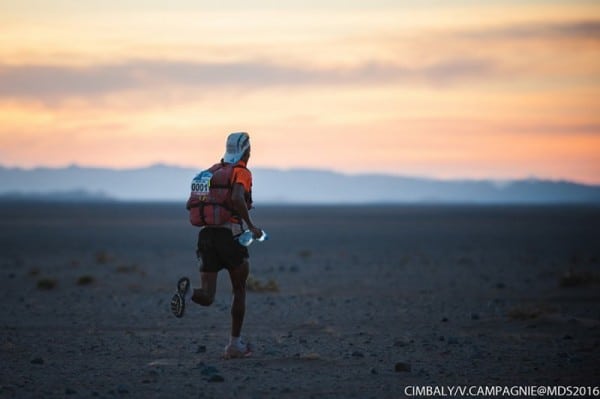
Rachid El Morabity running into the sunset and his win of Stage 4. Photo: Cimbaly/V. Campagnie MdS 2016
After each finish, Jose Manuel ‘Chema’ Martinez repeatedly talks of how he cannot catch the Moroccan leaders, but he can get close. During the fourth stage, he led Moroccan Aziz El Akad by nearly 20 minutes at one point; by the end, El Akad was just two minutes and nine seconds behind. Seven minutes and 30 seconds now separate Chema and El Akad in third and fourth place overall. El Akad said he turned up his speed at Checkpoint 6 after running with a slower rhythm through the beginning of the race. Multiple runners said the heat was worse for the fourth stage than previous days, and the Moroccan athletes guessed it reached above 110 degrees Fahrenheit during the middle of the day.
“It is important that the team is first,” El Morabity said from his corner of the tent after El Akad explained his race day. “And it is important that Aziz is third.”
Fernanda Maciel is more than two hours down from leader Natalia Sedykh in the overall rankings, but pushed ahead of Elisabet Barnes and Aziza Raji after the 21st kilometer to secure a solid third overall ranking. She was dehydrated and struggled through the first part of the race, she said. The flat, lighter sand part of the course was ideal for her speed, and she reached that section of the trail by sunset.
About 15 tents down from Maciel and the Spanish-speaking runners, the Russian athletes talked of Sedykh’s speed on the track and her ability to turn up the power went it is needed most—a skill which could come in handy tomorrow if Nathalie Mauclair is able to close the 23-minute gap between the two in the overall rankings.
“I told her to focus on her eye contact,” said Michal Glowacki, a Polish runner who finished 14th last year and stays in the tent down from Sedykh. If Mauclair leads, as long as she keeps her in eye contact, Sedykh can use her short-distance speed to get ahead in the final three to five kilometers, he said.
Defending champ Elisabet Barnes struggled with the heat the first three days, she said, and broke off from Aziza Raji about halfway through the fourth stage to jump to fourth overall, more than four hours behind Sedykh. Maciel and Raji flew past her on the technical downhill of the first jebel after Checkpoint 1, she said. At about 55 kilometers, the heat started to subside, and she felt a lot better, Barnes said. She had paced for about 12 hours, and beat her goal by 34 minutes.
“With eight percent humidity out here, you take a breath and it’s like your whole mouth is the desert,” she said.
Multiple repeat competitors said throughout the past two days that they felt this race was harder than previous editions, on account of the heat and the punishing terrain and wind of Stage 1. Just about 100 runners had dropped out before the start of the long stage, and another 30 abandoned sometime throughout the fourth day.
Update April 13, 3 pm US Mountain Time:
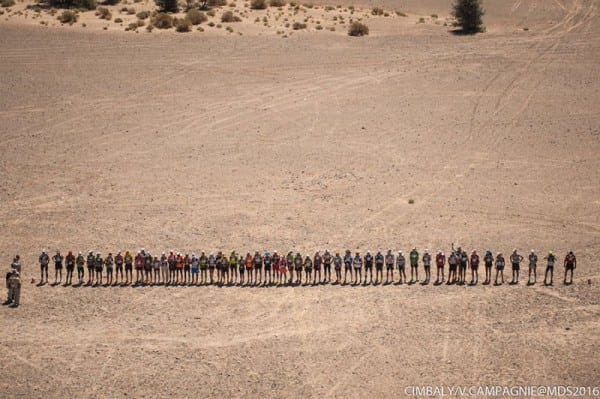
The start of the top-50 men and top-five women for Stage 4. Photo: Cimbaly/V. Campagnie MdS 2016
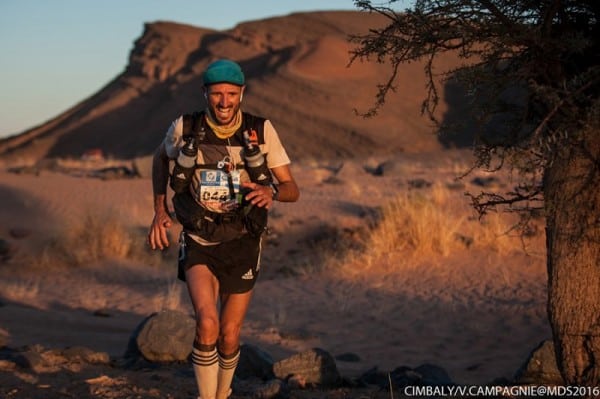
Chema Martinez works it on his way to taking third. Photo: Cimbaly/V. Campagnie MdS 2016
Stage 4 Competition Analysis
[Editor’s Note: The competition analyses in this article have been written by iRunFar Senior Editor Meghan Hicks, who is not racing MdS this year but who has finished the MdS five times.]
I don’t envy being Chema Martinez going into tomorrow’s Stage 5, the final competitive stage at a marathon’s distance. The guy has just run his heart out for four days in an attempt to be one of the few non-sandy-country-dwelling runners to get atop the MdS podium in the race’s competitive history. He’s sitting in third overall position, but Aziz El Akad is 7.5 minutes back. Aziz is known in his history with MdS of ripping off the fifth marathon stage to finish five to 10 minutes back of his other Moroccan competitors, let alone the rest of the field. At this point, this is what I find to be the most interesting story of the men’s race. Can Olympian Chema hold off a Moroccan for the podium? Tomorrow’s gonna’ be intense!
As for Rachid El Morabity and Abdelkader El Mouaziz at the front of the race, it’s looking like a repeat of last year, like our field reporter said. Rachid is just steady, steady, steady, and he always seems to have ample gas in the tank to turn it up and run like heck in the final kilometers of every stage. Methinks this part of the competition is already set and Rachid’s going to bring home his fourth MdS title. Not bad for a young guy born into socioeconomic challenge at the edge of the Sahara Desert, right?
Holy smokes, what Nathalie Mauclair did yesterday for the long stage is categorically off the charts for a woman at MdS or a woman at any race. She finished a few minutes less than an hour back of the Moroccan winners, in a 52-mile race that look the men a little over eight hours to finish. Compare that disparity to other 50-mile races around the world of that time length and difficulty, and you’d expect to see about a 75- to 80-minute deficit between top elite men and women. Talk about expanding the vision of what women can do.
Though Nathalie won the long stage, she still has a 23-minute overall gap to leader Natalia Sedykh. That’s a really difficult amount of time to surmount in the final marathon-distance Stage 5, closing in on a minute-per-mile difference. Of course, funnier things have happened in a race of this magnitude where there are so many more variables at hand besides just running, so we shall see. Of note, Natalia sits in 11th place overall in the rankings, and Nathalie 13th. Nathalia is 16.5 minutes behind the 10th place male overall, another difficult-to-surmount gap. Sure would be cool to see a woman inside the top-10 overall at a race like this one, though.
It’s fascinating to see that the men’s top 10 and women’s top 10 seem to be about set for the race once we get out of the top-two women and top-four men. It would take someone getting injured or having a big blow-up for positions to change much at this point. So, focused, smart, and conservative running for those women and men for one more marathon!
Stage 4 Route Information
Here it is, the MdS long stage for 2016. Unusual format, a route that loops back upon itself again. Stage 4’s course has everything in it, tons of sandy terrain via small dune fields and dried creek beds, a couple rocky jebels or hills, dried-up lake beds, and other flat and more gentle terrain. It’s a fascinating course, which visits quintessential MdS locations, like the little gorge of El Maharch, and heads into terrain not typically visited by this race. At 84.3 kilometers in length, today is a real tough one, no matter the terrain.
Of note, the MdS race admin starts the top-50 men and top-five women three hours after the rest of the field starts.
Stage 3
Stage 3 Results
- Rachid El Morabity (MOR) — 3:03.40
- Adelkader El Mouaziz (MOR) — 3:04.02
- Aziz El Akad (MOR) — 3:05.40
- Jose Manuel ‘Chema’ Martinez (ESP) — 3:18.55
- Samir Akhdar (MOR) — 3:25.22
- Erik Clavery (FRA) — 3:27.32
- Carlos Sa (POR) — 3:35.38
- Jean-Sebastien Braun (FRA) — 3:37.03
- Sondre Amdahl (NOR) — 3:42.18
- Ayns Ghandoura (FRA) — 3:42.18
Top American
11. Jason Schlarb (USA) — 3:47.19
Full stage and overall results.
- Natalia Sedykh (RUS) — 3:49.25
- Nathalie Mauclair (FRA) — 3:53.33
- Fernanda Maciel (ESP) — 3:55.53
- Aziza Raji (MOR) — 4:16.40
- Elisabet Barnes (SWE) — 4:37.28
- Sophie Laversanne (FRA) — 4:43.01
- Corrine de Parseval (FRA) — 4:46.18
- Pui-Yan ‘Wyan’ Chow (CHI) — 5:00.39
- Rosemary Lobley (GBR) — 5:07.25
- Nadine Gill (GER) — 5:08.59
Top American
12. Liza Howard (USA) — 5:20.17
Full stage and overall results.
Overall Standings through Stage 3
Men
- Rachid El Morabity
- Abdelkader El Mouaziz (+1:22)
- Chema Martinez (+44:15)
- Aziz El Akad (+49:36)
- Samir Akhdar (+1:08:24)
- Erik Clavery (+1:13:18)
- Carlos Sa (+1:37:19)
- Sondre Amdahl (+1:37:39)
- Jean-Sebastien Braun (+1:37:54)
- Edgar Parra Talero (+1:58:)6)
Full stage and overall results.
Women
- Natalia Sedykh
- Nathalie Mauclair (+35:27)
- Fernanda Maciel (+1:05:13)
- Elisabet Barnes (+1:59:51)
- Aziza Raji (+2:16:25)
- Liza Howard (+2:55:37)
- Sophie Laversanne (+3:07:29)
- Corrine de Parseval (+3:35:06)
- Selina McCole (+4:05:04)
- Rosemary Lobley (+4:11:17)
Full stage and overall results.
Stage 3 Field Report from iRunFar Correspondent
[Editor’s Note: The field reports in this article have been written by iRunFar field correspondent Jacqueline Kantor.]
Shortly after 1 p.m. local time, hours before the rest of the runners’ tents filled up with competitors, second-place female Nathalie Mauclair joined the Moroccan leaders in their tent to cook polenta and couscous over a small fire stoked by dried branches. The four Moroccan teammates and Mauclair stopped their chatting and cooking for a round of applause as Aziza Raji, the lone Moroccan female in the field, returned back to camp with a fourth-place finish.
After two consecutive days at sixth place, Raji jumped up to fourth in the 37.5-kilometer stage to land at fifth overall, which grants her a delayed start along with the other top-five women and the top-50 men–a tradition for the MdS’s long stage–in the beginning of the 84.3-kilometer fourth stage tomorrow morning.
“Today was good, just hotter,” she said. She didn’t change anything about her strategy, and hung with with Fernanda Maciel up until about Checkpoint 1. Maciel pushed ahead to take third and finish just about two minutes behind Mauclair, who again trailed Russian Natalia Sedykh.
Much of the third stage was small, rolling hills and flat course broken up by camel grass. Runners began with a flat sandy stretch in between burnt-orange dunes covered with black stones on the right and brown-red plateau, called “Kam Kam” by the locals, on the left next to the dried-out river, “Zeezee.”
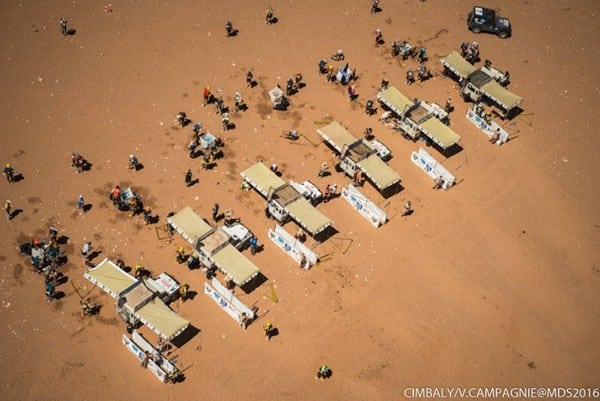
One of Stage 3’s water checkpoints. Photo: Cimbaly/V. Campagnie MdS 2016
Today was easier than yesterday, Mauclair said, and she’s learning better strategy for sand running each day. She kept in mind her mantra from back-to-back wins at the mountainous Grand Raid de la Réunion— “little steps by little steps by little steps”—and found that it worked just as well in shallow mounds of sand.
Samir Akhdar, who finished fifth for the second day in a row, guessed that the temperature was about 100 degrees Fahrenheit by early afternoon.
There was about six kilometers along a wadi, the dried riverbed of Oued Rheris, right before Checkpoint 3 where “you go from running easy and causal, to ‘I can’t breathe’ and you’re not going any faster,” said David Hellard, who finished at 16th.
That was right about the point where where the top-three finishers—Rachid El Morabity, Abdelkader El Mouaziz, and Aziz El Akad—split off from Chema Martinez and Akhdar, Akhdar said. The top three finished with a bit more than a minute between each of them, and in the overall rankings, El Morabity leads. Martinez, the best bet for a non-local on the podium, finished about 13 minutes after El Akad and is now 44 minutes and 15 seconds behind El Morabity and third in the overall rankings.
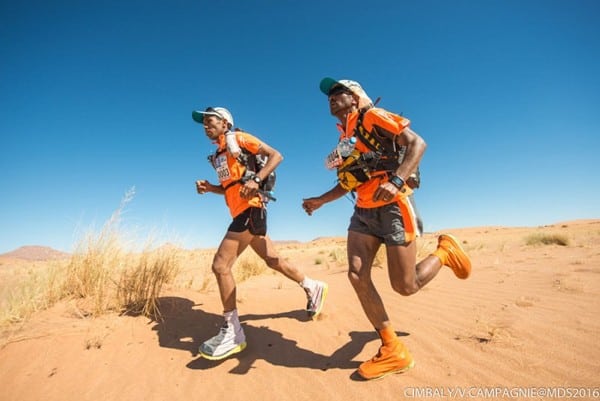
Abdelkader El Mouaziz (right) and Aziz El Akad, Moroccan teammates, run together during Stage 3. Photo: Cimbaly/V. Campagnie MdS 2016
More gaps closed in the women’s race leading up to the long stage, and Mauclair was able to get within four minutes of Sedykh today after finishing about 14 minutes behind yesterday and 17 minutes behind on the first day. Maciel, who finished 21 minutes ahead of Raji, struggled at the beginning, but got into her rhythm at about the 15-kilometer mark. The heat is a non-issue for the Rio de Janeiro native, but the lack of incline is challenging. The ascent of Foum Al Opath, a jebel or rocky hill, at about 17 kilometers was a welcome incline for her.
“It was flat, and it was hard because I ran all the way—I am from the mountains, where you run and walk as you go,” she said. “I’m learning how to move on the dunes, so now I can climb better.”
“When I see rocks, any sort of little climb, I think to my self, ‘yes!!’”
Maciel is easily the least experienced in MdS terrain of the top-five females. Barnes and Sedykh are repeat competitors, Raji is from Ouarzazate and had easy access to Sahara training, and, while it’s Mauclair’s first MdS, she trained in the Sahara for one week over the winter. Each day, Maciel feels less like she’s racing to win, and more like she’s racing to finish.
“I give all my energy, all day, 200 percent, because I feel confident that I can recover during the night,” she said.
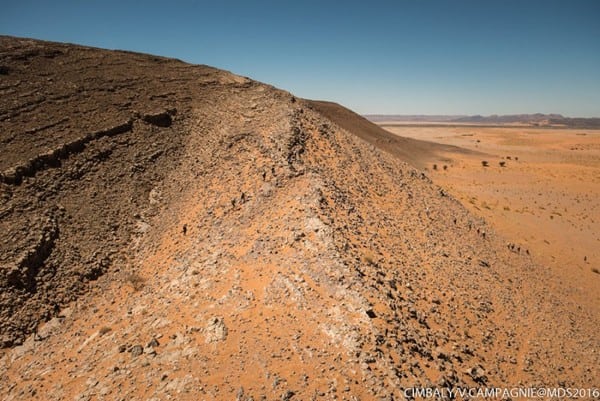
Runners cross a jebel, or rocky hill, during Stage 3. Photo: Cimbaly/V. Campagnie MdS 2016
Liza Howard, the top American female, dropped down to sixth among the women, so she will start with the rest of the field at 8:15 a.m. during the long stage. The first half of Stage 3 was fine for her, but in the second, the heat hit in full force and derailed her physically. She scaled back to keep herself healthy. Missing the cutoff for a late start is ideal, she said, to avoid the heat of the day.
Jason Schlarb, the top American male, is at 12th overall after an 11th-place finish in the third stage.
Defending champ Elisabet Barnes came in at fifth and about 11 minutes behind Raji. She is now at fourth overall and about 55 minutes behind Maciel’s third place.
Stage 3 Competition Analysis
[Editor’s Note: The competition analyses in this article have been written by iRunFar Senior Editor Meghan Hicks, who is not racing MdS this year but who has finished the MdS five times.]
After a couple days of shake-ups around the men’s top five to top 10, it seems like today was a more chill round for the boys. That said, tomorrow brings the long stage, something in the vicinity of 80 kilometers, and what that means is shake-ups abound. Rachid El Morabity and Abdelkader El Mouaziz sit firmly at the top of the overall rankings going into tomorrow’s long stage. The pair goes into the long stage with a 45-minute lead on the rest of the field, so steady, non-risky running tomorrow will surely keep them atop the rankings. As for the duel between the two, Rachid holds just an 82-second lead over Abdelkader. I’m not 100% convinced that these guys are actually competing against each other per se, as opposed to working together to set themselves apart from the rest of the field. That also said, if they are racing each other, there’s no one besides the Moroccan Ahansal brothers–neither of whom are racing this year–who can race the MdS long stage like Rachid.
There’s definitely a fierce battle evolving for third position right now between Spain’s Chema Martinez and Morocco’s Aziz El Akad. Aziz appears to have ran hard today to make up some of the deficit he had to Chema in the overall standings, finishing today’s stage third and only 1.5 minutes back of the lead. Chema enters the long day in third overall, but Aziz is just about four minutes back. For me, this is the most exciting part of the men’s race at the moment. Podium-ing in the MdS is a huge deal for Moroccan male athletes–a huge source of national pride. And since European and North American men so rarely make it to the men’s podium, I’m sure Chema wants it real bad, too. The last time a non-sandy-country-dwelling person was on the MdS podium was 2012 when Michael Wardian took third in the overall rankings. Tomorrow’s long-stage battle between Chema and Aziz is going to be good.
As for the women’s race, Natalia Sedykh won the stage again, but this time she was only four minutes ahead of Nathalie Mauclair. Lots of questions emerge here. Did Natalia slow down or did Nathalie speed up? And if Natalia slowed, did she do that intentionally ahead of tomorrow’s long stage or is she starting to feel the fatigue of running two days at unheard-of-for-a-woman-at-MdS speeds? Based on today’s results, it appears that Natalia, indeed, ran slower relative to the men’s field today as compared to Stages 1 and 2. And it also appears that Nathalie didn’t speed up, but that she ran about the same pace relative to the men’s field today as the first two days. So we are left wondering the reason behind Natalia’s slower pace today and what will happen tomorrow.
After a slow start on Stage 1, Fernanda Maciel has finished third woman in both Stages 2 and 3, and only a couple minutes each day behind Nathalie Mauclair in second. It seems like she’s digging her heels in and figuring what this MdS thing is all about. She’s a long-haul specialist, so I imagine she’s going to do just fine in tomorrow’s long stage.
Holy Aziza Raji, she finished fourth today! The little Moroccan firecracker, I was told by my Moroccan friends, has great potential in the MdS, but that she needs some time to develop as an athlete. They said she will get stronger as the race goes on, and as the years go on. It seems they are predicting correctly. Aziza now sits in fifth in the overall rankings, but she’s just 17 minutes back of defending champ Elisabet Barnes. Tomorrow’s race between this pair is going to be a great one to watch as well.
It appears that Elisabet Barnes isn’t racing with the same fitness this year as in 2015. Today she finished fifth and some 45 minutes back from the lead. In watching her race with such strength on her way to her win last year, I don’t expect to see any huge dips in her performance during tomorrow’s long stage. I predict steady-as-she-goes pace. The only question is if that pace will be enough to fend off Aziza.
Liza Howard appears to have had a rough day today, finishing 12th and 90 minutes off the lead. This puts her a full two hours out of podium contention going into the long stage. She’s now in sixth in the overall standings, and about 39 minutes out of the top five. Again, big shake-ups happen during the long stage, so if Liza can put together a big day tomorrow, I think she can nose her way back into the women’s top five. Also interesting to her race is that the MdS starts the top-five women (and top-50 men) three hours after the rest of the field. So Liza and the women behind her in the rankings will race separately from the five front women and won’t know how they are stacking up until after the stage.
Three-time MdS champion Laurence Klein (France) dropped from the race on Stage 2. We don’t know the reason.
Stage 3 Route Information
The MdS’s course creators always go a little ‘easy’ with their design of Stage 3 course, probably because the looooong Stage 4 beckons and everyone could use an ‘easier’ day beforehand. Today runners had flat, runnable terrain for most of the stage’s 37.5-kilometer distance, though they encountered several shorter dune fields, one small jebel (rocky hill), and likely some very sandy terrain at the edge of Oued Rheris.
Oued Rheris is an MdS mainstay: it’s a giant, sandy, dry wash, and one of the main drainages of this part of the Sahara. It’s a really cool feature of the ecosystem especially because, while there isn’t water unless there’s been rain within a few days, you’ll often run past blooming flowers and trees, a sure sign of it being spring in the desert and a welcome sight after so many kilometers of starker terrain. That said, depending on the route you take through it, it can make for some super sandy running.
Stage 2
Stage 2 Results
- 1. Rachid El Morabity (MOR) — 3:24.04
- 2. Abdelkader El Mouaziz (MOR) — 3:24.31
- 3. Aziz El Akad (MOR) — 3:43:10
- 3. Jose Manuel ‘Chema’ Martinez (ESP) — 3:43.10
- 5. Samir Akhdar (MOR) — 3:54.40
- 6. Erik Clavery (FRA) — 3:58.09
- 7. Sondre Amdahl (NOR) — 3:59.41
- 8 Carlos Sa (POR) — 4:05.37
- 8. Jean-Sebastien Braun (FRA) — 4:05.39
- 10. Jason Schlarb (USA) — 4:11.32
Full stage and overall results.
- Natalia Sedykh (RUS) — 4:10.46 (10th overall finisher)
- Nathalie Mauclair (FRA) — 4:24.43
- Fernanda Maciel (ESP) — 4:26.47
-
Elizabet Barnes (SWE) — 4:51.46
-
Liza Howard (USA) — 4:57.50
-
Aziza Raji (MOR) — 5:10.56
-
Corrine de Parseval (FRA) — 5:25.09
-
Rosemary Lobley (GBR) — 5:29.01
-
Selina McCole (GBR) — 5:31.16
-
Meghan Arbogast (USA) — 5:31.36
Full stage and overall results.
Overall Standings through Stage 2
Men
- Rachid El Morabity
- Abdelkader El Mouaziz (+1:02)
- Chema Martinez (+29:02)
- Samir Akhdar (+46:43)
- Aziz El Akad (+47:38)
- Erik Clavery (+49:27)
- Sondre Amdahl (+59:03)
- Jean-Sebastien Braun (+1:04:32)
- Carlos Sa (+1:05:23)
- Edgar Parra Talero (+1:10:41)
Full stage and overall results.
Women
- Natalia Sedykh
- Nathalie Mauclair (+31:07)
- Fernanda Maciel (+58:29)
- Elisabet Barnes (+1:11:38)
- Liza Howard (+1:24:34)
- Aziza Raji (+1:40:00)
- Meghan Arbogast (+2:12:12)
- Sophie Laversanne (+2:13:43)
- Corinne De Parseval (+2:38:01)
- Selina McCole (+2:39:15)
Full stage and overall results.
Stage 2 Field Report from iRunFar Correspondent
[Editor’s Note: The field reports in this article have been written by iRunFar field correspondent Jacqueline Kantor.]
Stage 2 sent the runners off with their packs to the punishing dunes that fatigued elites and led to more than 20 dropouts on the first day, and “Another One Bites the Dust” aptly greeted the crowd for an 8:30 a.m. start. The beginning of the course led through a sandy, stony flat stretch and onward to smaller, darker orange dunes covered with black stones. Monday’s 41.3-kilometer course featured smaller sand hills and stony terrain through wadis and two small villages, and minimal obstacles allowed for faster speeds. There was more running and less thinking, said several of the top finishers, but the increased pace exhausted more technical runners and allowed for the heat of the desert—close to 90 degrees Fahrenheit by late afternoon—to fully set in.

The start of Stage 2. Photo: Cimbaly/V. Compagnie MdS 2016
Defending champ Rachid El Morabity again took first, this time with a 26-second edge on teammate Abdelkader El Mouaziz, finishing at a 4:56/kilometer pace (7:57/mile). He averaged 5:36/kilometer (9:00/mile) through the sand and wind yesterday.El Mouaziz entered Checkpoint 1 first with Abderrahmane Moatacim, Hammou Moudouji, and El Morabity close behind. Morabity and El Mouaziz had just about a minute on the closest runners behind until Checkpoint 3 at 32.5 kilometers. They took advantage of the flat, sandy, and sparsely-vegetated final kilometers to gain close to a 20-minute advantage on Aziz El Akad and Jose Manuel Chema Martinez, who finished hand-in-hand.
El Morabity picked up his pace significantly toward the end because of the trailing competitors, he said, and having El Akad and Martinez on his tail provided extra motivation. Tomorrow, he’ll look to conserve energy for the long stage on Day 4.
“This stage was not very difficult, it was very fast, and the wind made it a little complicated,” Martinez said. “I’m very happy today. It’s difficult to beat the Moroccans, but I am getting closer. They live here. They know the mountain, the sand. They have a control of the way. I try to stay with them. I was tired, but everyone is tired today.”
Runners like Carlos Sa, who finished at the same time as Jean-Sebastien Braun, found the speed of Stage 2 challenging; others savored the opportunity to focus more on pace and less on navigation.
“This was way better than yesterday,” said Sondre Amdahl, who finished seventh. “Yesterday I had problems with seeing ahead, today I could just concentrate on running. It was a good effort throughout.”

Jason Schlarb and David Hellard in Stage 2’s small sand dunettes and camelgrass. Photo: Cimbaly/V. Campagnie MdS 2016
Natalia Sedykh of Russia, who made a spirited finish yesterday to take first place among women by 17 minutes, entered the bivouac today equally optimistic at 10th-place overall and first female. She finished 36 minutes behind El Morabity and 14 minutes ahead of the second woman, Nathalie Mauclair.“It was perfect, just like a stadium,” said Sedykh, who specializes in the 10k. Last year, she ran her first half marathon in January, her first marathon in February, and her first Marathon des Sables two months later. She has a 2:46 marathon PR from last fall and has run 33:54 for 10,000m in 2011. She returned to the desert this year looking to right her rankings after a one-hour penalty knocked her to third place last year.
“I believe in magic,” she said last night, after resting up in her tent with a crew of fellow Russians. “I am very surprised to be first, but I am highly motivated from last year. I know it’s only the last finish line that matters. I’m just thinking about the next day, and then the next day after that.”
Mauclair came through the finish equally cheery after a “faster course than usual,” she said, and was followed by Fernanda Maciel about two minutes later. Maciel’s prep for this race includes a record-breaking ascent of Aconcagua, the highest mountain in South America, in February. The effort at altitude left Maciel anemic, she said, and she’s feeling the strain after two days of desert. But the speed in Stage 2 suited her better, she said, given her lack of experience with dune running.
“Today I enjoyed all the course,” she said. “I love the wind, because you feel fresh when it’s against you.”
Samir Akhdar entered his eighth MdS last year with a goal of finishing in the top five. He finished fourth, and entered this year’s aiming for the top-three spot claimed by El Akad last year. He held tight with El Akad and Martinez until Checkpoint 2 today, then fell off by 11 minutes by the finish. The next few stages, particularly the longest, are the most important, he said, and he’s hoping to gain the time back on the longest day.
“I took my time and went slowly, but it was better than yesterday,” he said.
Yesterday’s second-place finisher, Moroccan Hammou Moudouji, dropped down to 28th in Stage 2 after doubling back to retrieve his water card. He realized he dropped it at about one kilometer past Checkpoint 3, and ran back four kilometers before finding a runner who had retrieved it at Checkpoint 2. Continuing without the card would have resulted in an hour penalty, and at this stage in the race, retracing his steps was less risky than running onward. Otherwise, the course was “very flat, very easy,” he said, and easier than yesterday besides the heat. Moudouji specializes in the marathon and is making his first MdS appearance. Moudouji’s misstep and Edgar Parra Tolero’s drop down from the top 10 made room for American Jason Schlarb, who finished 15th yesterday, to take 10th man and 11th overall today.

Defending champ Elisabet Barnes running Stage 2. Photo: Cimbaly/V. Campagnie MdS 2016
Stage 2 Competition Analysis
[Editor’s Note: The competition analyses in this article have been written by iRunFar Senior Editor Meghan Hicks, who is not racing MdS this year but who has finished the MdS five times.]
Holy smokes, not only is this year’s women’s race the most competitive we’ve yet seen at the MdS, but it could also be the most interesting in the race’s 31-year history. Natalia Sedykh blew it out of the water again today, finishing 10th overall for Stage 2. I don’t think a woman’s ever finished in the top 10 of an MdS stage before, unless we’re talking in the race’s first couple years when it had very few entrants. She’s truly hauling. Tomorrow should be fascinating. Is she running sustainably for a week of racing? Time will tell.
Nathalie Mauclair ran stronger today in second than she did yesterday, finishing about 14 minutes back from Natalia in a longer stage as opposed to yesterday’s 17 minutes from the lead. And here comes Fernanda Maciel. After finishing out of contention of the lead yesterday, Fernanda was third and about 16 minutes back today. With Fernanda’s strong push today, she moved herself up into third position in the overall rankings. Both Nathalie and Fernanda have proven themselves in long mountain endeavors, so how they fare in coming days will be fascinating, too.
Defending champ Elisabet Barnes is now in fourth in the overall rankings. She finished a 30-minute deficit to the lead yesterday and a little over 41 minutes today, a longer stage. It seems like her pace is steady relative to the women’s lead through both of the first two stages, but that she’s running slower relative to the men this year than when she won last year.
Liza Howard finished Stage 2 in fifth, and is now fifth in the overall standings, too. She gave 37 minutes to the lead yesterday and 47 minutes today. Like Elisabet, Liza’s pace relative to the women’s lead seems pretty steady, and overall pretty close comparatively to her pace from last year relative to the top men.
Great stuff in the men’s race, too! We have a non-Moroccan in the overall top three right now, Spaniard Chema Martinez! However, he’s got Moroccans Samir Akhdar and Aziz El Akad breathing down his back in the overall standings. There have been huge shake-ups in the top of the men’s race in just the first two days, and so there are sure to be more.
One thing seems sure, though: Rachid El Morabity and Abdelkader El Mouaziz have clearly started putting on their clinic over the rest of the runners. The pair finished one-two and 19 minutes ahead of the rest of the field today, which puts Rachid ahead of everyone else who isn’t Abdelkader by a full 39 minutes in the overall rankings. This is a lot of time, many more minutes than we are used to seeing at just two stages into the MdS in the race’s last decade or so. The question is, are those two putting in more of an effort in these first days to break from the field more strongly? Or, is the pair running similar to the previous couple years with others in the field being unable to challenge as closely this year? From the field we hear that the pair ran the last quarter of the race a lot faster than the rest of the field, so perhaps they were, indeed, trying to dig in a little lead over everyone else.
Stage 2 Route Information
At just shy of a full marathon’s distance and so some seven kilometers longer than Stage 1, Stage 2 took the lead men about 15 minutes longer than yesterday, which means today’s course was significantly more runnable. Much of the first two thirds of the course was flat, runnable terrain, from the starting line to the second water checkpoint at 34.5k. After that, it was a brief and rugged crossing of a jebel, or hill in Arabic, to the finish line.
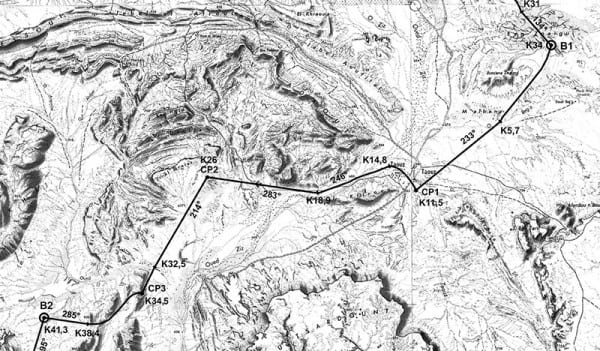
Stage 2 route map. Image courtesy of the Marathon des Sables.

The MdS Roadbook route instructions for Stage 2. Image courtesy of the Marathon des Sables.
Stage 1
Stage 1 Results
- Natalia Sedykh (RUS) — 3:40.20
- Nathalie Mauclair (FRA) — 3:57.30
- Elisabet Barnes (SWE) — 4:10.57
- Liza Howard (USA) — 4:17.50
- Fernanda Maciel (ESP) — 4:22.49
- Aziza Raji (MOR) — 4:29.09
- Meghan Arbogast (USA) — 4:31.42
- Sophie Laversanne (FRA) — 4:32.25
- Federica Boifava (ITA) — 4:45.28
- Maree Jesson (GBR) — 4:51.31
Full stage and overall results.
- Rachid El Morabity (MOR) — 3:10.29
- Hammou Moudouji (MOR) — 3:10.46
- Abdelkader El Mouaziz (MOR) — 3:11.04
- Jose Manuel ‘Chema’ Martinez (ESP) — 3:20.30
- Erik Clavery (FRA) — 3:25.52
- Samir Akhdar (MOR) — 3:26.36
- Jean-Sebastian Braun (FRA) — 3:33.26
- Edgar Parra Tolero (COL) — 3:33.29
- Sondre Amdahl (NOR) — 3:33.55
- Carlos Sa (POR) — 3:34.19
top American men:
15. Jason Schlarb 3:42.36
16. Harvey Lewis 3:42.39
Full stage and overall results.
Stage 1 Field Report from iRunFar Correspondent
[Editor’s Note: The field reports in this article have been written by iRunFar field correspondent Jacqueline Kantor.]
The difficult dune passages and strong headwinds in the first stage left even the most skilled local competitors struggling as they crossed the finish line after noon Sunday.
About 30 minutes after defending champ Rachid El Morabity completed the first stage, his teammate Abderrahmane Moatacim walked slowly down the last dunes of Erg Znaigui and toward the second bivouac until teammate Aziz El Akad caught up with him. Akad grabbed his hand to lead him into a jog until the finish. The pair stepped off to the side quickly, and as Akad helped his teammate pull off his pack for a moment of relief, Natalia Sedykh of Russia sprinted through the finish line smiling and seemingly unfazed by the same course that had a left a local defeated. She was the 13th finisher overall, the first female, and the first runner to cross the finish line grinning.
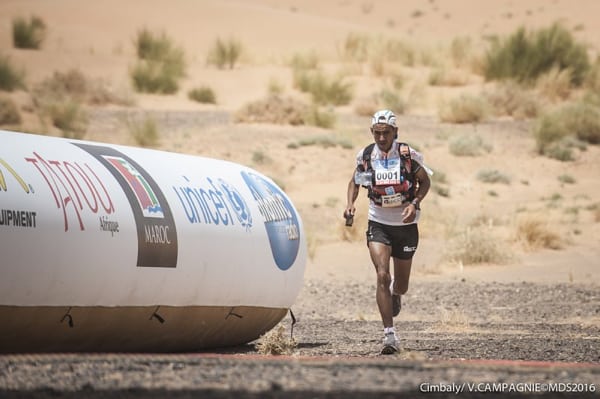
Rachid El Morabity won Stage 1 by a few-second margin. Photo: Cimbaly/V. Campagnie MdS 2016
“That was very nice,” she told the staff waiting by the finish line. “Thank you for all the sand.”
Sedykh finished in an unofficial 3 hours, 40 minutes, and 20 seconds, and did not realize she was the first female finisher until an interview with the Moroccan media.
“I am happy but it is only the beginning,” she said, still grinning and bouncing on her feet. “We have a very difficult path ahead.”

Natalia Sedykh was the runaway women’s Stage 1 winner. Photo: Cimbaly/V. Campagnie MdS 2016
The first stage began at 9 a.m. with a light breeze and a direct path into the Erg Chebbi dunes for about 12 kilometers; it ended with three kilometers through the Erg Znaigui dunes and a fierce wind that drew directly into the runners’ path and picked up significantly about an hour after the first runners returned to the bivouac. The Moroccan men swept the first three spots—El Morabity, Hammou Moudouji (MdS novice, road runner), and Abdelkader El Mouaziz all finished within 35 seconds of each other. Moatacim had rolled through the first checkpoint with the leaders, but fell back as the top three stayed tight together until the last few meters. The top three ran together up until the last meters.

The men’s lead pack, led by Rachid El Morabity, worked the Stage 1 sand dunes. Photo: Cimbaly/V. Campagnie MdS 2016
“The wind creates problems,” El Mouaziz said. “And it’s more difficult this year because there are others that are very strong, competitors from Europe and America. It puts a little stress on us.”
Right after the finish, El Morabity went straight to the counter where runners pick up post-run cups and slouched down with his head toward the table. El Mouaziz, the captain of his team, grabbed him and Moudouji into a huddle as the three recovered from their final sprint.
By the time Jose Manuel ‘Chema’ Martinez of Spain rolled in about nine minutes after the first trio, the wind had picked up, and the dunes just beyond the finish line were obscured by sand.
Nathalie Mauclair was the second woman and 17 minutes and 10 seconds behind Sedykh, and found that the elements made tactical decisions in the sand trickier. “I always have to be looking to see where to place my feet for the dunes,” she said. “But it was difficult to see.”
The course spit the runners out of the dunes right at Checkpoint 1. They jogged past a lone muddy brown house and clubs of acacia trees before a dry wadi and flat, sandy stretch that looked deceivingly solid, said defending champ Elisabet Barnes, who came in 13 minutes and 27 seconds behind Mauclair. It reminded her of the soft sand of the Oman Desert Marathon, and provided little relief after the dunes.
“Once we finally got to the flat ground, that’s when we got the tough headwinds,” she said. “It was a tough stage given the amount of sand.”
“Those sand dunes were mean,” said Harvey Lewis, who finished at 16th and three seconds behind fellow American Jason Schlarb.
Liza Howard of the U.S. finished about seven minutes after Barnes in fourth place and said the stage was tougher than any of the first three days in the 2015 edition; first-timer Meghan Arbogast (USA), who came in seventh, called it the “harshest environment I’ve ever run in.”
“The wind was so relentless, and so loud,” she said. “I just jogged along and didn’t fight the wind. And if it’s like this every day, it’s going to be really tough.”

Stage 1 featured a 12-kilometer crossing of the Erg Chebbi, one of Morocco’s largest dune fields. Photo: Cimbaly/V. Campagnie MdS 2016
Stage 1 Competition Analysis
[Editor’s Note: The competition analyses in this article have been written by iRunFar Senior Editor Meghan Hicks, who is not racing MdS this year but who has finished the MdS five times.]
Because the MdS’s live-tracking system malfunctioned for Stage 1, we don’t yet have access to splits and positions on top runners through each checkpoint today, so we won’t analyze the competition too much. However, a few notes become apparent with the data we’ve so far received from the field:
- Natalia Sedykh’s pace is really the story of the day. She finished 30 minutes back from the top Moroccan men, took 13th place overall, and ran at a pace that some top European and North American men couldn’t maintain. Her pace is unheard of by a woman at the MdS and will be history-making if she can sustain it. That said, having watched her race last year–her first year at the MdS, where she took third–she took some of the stages out hard and slowed as they went on. Though I should note that when she slowed at times last year, her slower pace was still a very competitive speed for the MdS. Fascinating stuff here.
- Hammou Moudouji had a great first day, and hung with top experienced Moroccan countrymates through the finish. He’s a fast Moroccan road runner who is running the MdS for the first time. Time will obviously tell if Hammou can hang for week of running with his more experienced countrymates, but he’s kept himself in contention through Stage 1. Again, a super fascinating story.
- There’s a spread of more than 40 minutes between the top woman and fifth place Fernanda Maciel. But if you take Natalie’s result out, there’s a 25-minute spread between women’s positions 2 and 5. This is a little bit bigger than I expected; I was thinking it would be a 10- to 15-minute spread for the top-five women in each of the first three stages this year. MdS is a race where literally anything can happen because of its challenging variables, so I expect some real shake-ups here.
- Three top Moroccan men have already set themselves apart from the rest of the field by 10 minutes, with the leading non-Moroccan a not-surprising Chema Martinez. This seems like an expected spread. Moroccan Samir Akhdar’s position about 12 minutes off the leaders is a surprise, however. I expected him to finish about three or four minutes behind the lead, and it makes me wonder if last year’s fourth-place finisher had a bit of a tough time today?
Stage 1 Route Information
The 2016 MdS Stage 1 route began with three kilometers of flat running straight toward one of Morocco’s largest and tallest field of dunes, the Erg Chebbi. Then runners contended with a 12k crossing of that dune field. The field’s shifting sands with little to no navigational markers on the first day, when everyone’s packs are the heaviest, was surely the day’s greatest challenge for most.
Upon exiting the dunes, runners hit the first water checkpoint, and continued onto a relatively flat section lasting all the way to the second water checkpoint at 25.8k. This section surely saw the top runners hammering at some of the fastest speeds we’ll see them all week, though contending with the hidden obstacles and challenges always present in this part of the Sahara Desert.
From there, it was variable terrain, some hills and another small set of sand dunes, until the finish, 34k from where it all started earlier in the day.

Stage 1 route map. Image courtesy of the Marathon des Sables.

The MdS Roadbook route instructions for Stage 1. Image courtesy of the Marathon des Sables.
Check-In Day
Check-In Day Field Report from iRunFar Correspondent
All around the bivouac on the day before the start of the 2016 Marathon des Sables, competitors spent their first full day in the desert making last-minute adjustments and exploring the MdS village that popped up in the Sahara about eight miles from the village of Merzouga. First-timers packed and repacked their bags nervously before parting with their less necessary belongings; elite runners talked of heat acclimation and quick trips to desolate trails in the last month.
Last-minute, pre-race race training ranged from 48 hours in Death Valley (Badwater champ Harvey Lewis of the U.S.) to four days on the beach in Rio de Janiero (Fernanda Maciel of Brazil) to two weeks in the Sahara and in the Middle Atlas mountains of Morocco (three-time winner Rachid El Morabity and his Moroccan team).
El Morabity’s crew of likely podium finishers—Abdelkader El Mouazis (second place in 2015), Aziz El Akad (third place in 2015) and Abderrahmane Moatacim (first-time MdS competitor) — spent much of their time at Erg Chebbi, which will provide the starting terrain for tomorrow’s Stage 1 of the 31st edition. The pink-orange dunes loomed in the background of the bivouac, providing a perfect photo op for runners to pose with their gear as well as an ominous sign of the 34 kilometers ahead. The first stage starts in the dunes, heads into the village of M’Fis, and onward to mines, through variably hilly terrain and into a small gorge before ending just beyond the Erg Znaigui dunes.
“I’m feeling all right, very relaxed,” El Mouaziz said as he stood at the entrance of the circle of runner’s tents, greeting runners from last year and posing for photos with El Morabity and foreign friends and fans.
The Moroccan men snagged the top-four spots last year, with Salameh Al Aqra of Jordan in fifth and Jose Manuel ‘Chema’ Martinez of Spain a spot behind. The best bets to challenge Martinez as the top non-Moroccan male could be one of three contenders joined together by Team I Run 4 Hope. Lewis, Jason Schlarb (USA), and Carlos Sá (Portugal) are all potential top-10 finishers and part of a team looking to raise awareness for children with ADHD.
Lewis was able to fit some sand dunes into training with his brief trip to Death Valley—“but not as big as those,” he said, pointing to Erg Chebbi in the distance. “But I’m happy about it.” He ran 62 kilometers in 48 hours during that trip, and at home in Cincinnati, Ohio, he runs the 10 kilometers to and from work every day at a public-arts school with his backpack and the backpack of a student. Cincinnati is hilly enough to offer some prep for this race, Lewis said, and running in the snow is not the same as the thin sand of the Sahara, but still offers a considerable challenge.
Lewis will turn 40 on the day of the longest stage of the race, and said all of his training and “chipping, chipping, chipping away” at personal goals has led to this point.
“When I first started running, at 15, it took me five years to break a five-hour marathon,” he said. “It took me 17 years to qualify for the Boston Marathon. It took me 22 years to make the U.S. team, and it’s all led to this—the fastest I’ve been in my life will be tomorrow.”
Schlarb, his tentmate and teammate, took two quick trips to the desert nearby his home of Durango, Colo., to get prepped. He’s drawn to cold-climate races but was convinced to compete after hearing Dave Mackey, the top American finisher in the 2015 edition, call it a “life experience.”
“It’s unlike just showing up to a race. You hang out, you talk, you gain friendship, while having this challenge of carrying everything, and challenging the body and the mind.”
The runners spent their last day before self-sufficiency lounging around in sleeping pads they would soon abandon, fastening country flags to the otherwise indistinguishable black tents in the runner’s village, and getting to know their tentmates that would greet them back at camp throughout the week.
“This is unlike anything else,” said Liza Howard, who was in podium contention last year before getting sick during the fourth stage. “There’s the racing and the running, and then the culture—this strange tent city that exists, away from communication, no phones, no Kindles.”

2016 MdS runners listen to the check-in day runner briefing. Photo: iRunFar/Jacqueline Kantor
Her tentmate and fellow top female contender, Meghan Arbogast, is making her first appearance at Marathon des Sables. She’s looking forward to the running, and dreading the cold at night.
“This is a new experience,” she said. “A clean slate.”
Defending champion Elisabet Barnes has returned to the race with a vastly different welcome than last year. In 2015, she was a relative unknown who had placed 15th in her first MdS in 2012. This year, she’s getting used to the new attention from media and other runners, and coming off a “year of transition” marked by a hectic work and running schedule, in part due to her win last year. The draw of the MdS is the ability to spend a week focusing on the basics—eat, sleep, run—and her defending title means that simplicity is somewhat complicated already.
“I’m going to run my own race,” she said of the competitive women’s field this year. “You can’t get drawn into what other people are doing, because it’s such an extreme environment. You have to race with your head.”
Call for Comments
- What do you think of the progress of this year’s Marathon des Sables?
- For whom are you cheering?
- Would you like to race the MdS?
